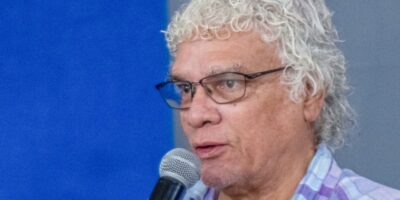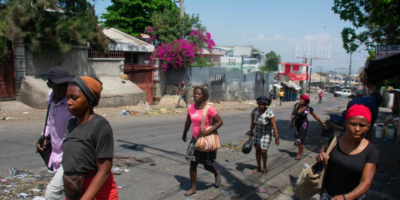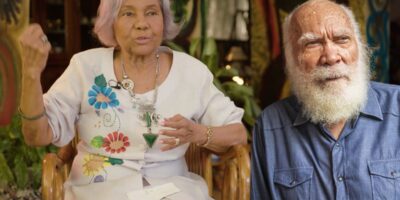At the heart of the Haitian revolution leading to the Independence in 1804, there was an instrument of rebellion: the machete. This tool used for working the land was transformed by the slaves into a weapon for freedom. More than two hundred years later, this fencing art is not dead; it is still practiced in rural Haiti. The documentary Papa Machete features this living Haitian tradition at the 2015 Sundance Film Festival this week.
.
.
Who or what is Papa Machete?
The film title Papa Machete refers to the star of the film, the “Professor” Alfred Avriel, a Haitian farmer and master machete fencing teacher in Jacmel. Unfortunately he recently passed away. We found out about him through the work of The Haitian Machete Fencing Project, a group dedicated to promote and teach this martial art worldwide. Initially the idea was to travel to Haiti only to learn how to fence. As a
.
How was your experience producing Papa Machete in Haiti?
When I was young, I used to watch primarily kung fu movies. Those Chinese movies always tell the story of a lone old man who knows a secret style of fighting, and the hero has to travel to find this person. When we were doing Papa Machete, I realized that we were doing the same thing: not in China, but in Haiti. That was very powerful because Haiti was the site of an important moment in the past, the beginning of the slave revolution in 1791. I don’t think that many Westerners know much about this. So to learn this form of
.
What does it mean to you to be selected for this year’s Sundance Film Festival?
Over 6 000 short documentary films submitted, and only 15 were selected to participate in the festival. It’s very exciting because Sundance might be the most exciting festival you can get accepted to as an independent filmmaker. The same is true for TIFF, which kicks off the festival and awards season. The best films in the world participate in these festivals. We are not a big Hollywood company. We are just independent filmmakers, who have to find our own funding. It was a big investment of time, energy and money. So to be selected in these two festivals is very rewarding. I have worked for a few TV shows before in smaller roles; Papa Machete is my first film as a producer. It was a big risk. It was difficult. But it paid off.
.
How did the audience receive the film?
People received the movie really well at TIFF. I remember there was one lady, originally from Haiti but who has been living in Canada for many years, in the audience. She really enjoyed the film because the film shows Haiti differently. In America when we see images of Haiti on TV, it’s usually related to the earthquake, the poverty or some political trouble. Haiti has one of the richest cultures in the world. And we didn’t want to make a film that fits the typical stereotypes that you see in the media outside Haiti. We wanted to show the cultural. That’s why this woman felt grateful for the movie. So after this feedback, we realized that we were on the right track, that we captured what we experienced there: a beautiful culture.
.
Papa Machete promotes a vital piece of Haitian culture with deep roots in history. Do you have a particular purpose with this movie?
With this movie, our ultimate goal is to make people go to Haiti. After all, it really doesn’t matter if they want to learn how to fence. After the audience sees the rich culture of the country, we hope they will book a ticket to discover the country as we did.
.
What is the next step after Sundance? Haiti?
We would love to show the movie in Haiti. Actually, we don’t have plans now to do that. But for us it’s important to connect with local Haitians and the Haitian diaspora. We have been selected to other film festivals but we cannot announce details yet. We were able to show the film at a cultural center in Miami. I would say that those experiences are the beginning because after Sundance, we expect to take this film to other festivals around the world. So our best experience is still to come.
.
Do you want to continue to produce movies like this one?
There are many stories in the Caribbean that have not been told yet. Especially thanks to the decreasing production costs, Caribbean cinema is really beginning to emerge. For a long time it was hard to find Caribbean movies. But now you find very authentic stories, made by people coming from those countries. We have a collective called Third Raising; its focus is on making films about the Caribbean and the Caribbean diaspora. We would like to continue to produce films like Papa Machete, in Haiti, Jamaica, Barbados and all over the Caribbean. This year we would like to make a longer version of this film. The Machete fencing is all over the country, not only in Jacmel I believe. We want to find more people who know about the history of machete fencing. There is so much more to be told.
Interview by
.
2015 Sundance Film Festival: January 22 to Febuary 1rst .
Place: Utah (USA).
Title of the film: Papa Machete.
Category: Short documentary.
Duration: 11 minutes.
Time of production: 6–8 months.
Budget: around 15 000 dollars.
.
.







Comments